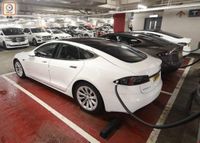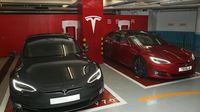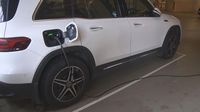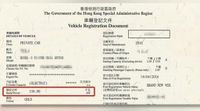The Transport and Logistics Bureau of Hong Kong has announced a proposal to adjust the license fee structure for electric private cars, suggesting a shift from the current weight-based system to one based on rated power. This change aims to align the fees more closely with technological advancements in electric vehicles and to ensure that the fees reflect the actual value of these vehicles.
As it stands, electric vehicle (EV) owners pay an average annual license fee of about 1,100 Hong Kong dollars, which is significantly lower than the approximately 7,500 Hong Kong dollars paid by gasoline vehicle owners. This discrepancy, noted by the Bureau, amounts to a sixfold difference. Under the proposed plan, the electric vehicle license fees could eventually rise to 70% of the fees for gasoline vehicles, but they will still remain lower than those for traditional vehicles.
The new fee structure will classify electric vehicles into five tiers based on their rated power. The first tier will include vehicles with a rated power of 75 kilowatts or less, with a license fee starting at 1,500 Hong Kong dollars from the end of 2025 until December 2026. This fee will then increase to 2,000 Hong Kong dollars in 2027 and reach 3,000 Hong Kong dollars by 2028. The subsequent tiers will see fees rise progressively based on power output, with the highest tier, for vehicles exceeding 225 kilowatts, reaching up to 11,000 Hong Kong dollars by 2028.
The Transport and Logistics Bureau emphasized that this change is necessary due to the advancements in electric vehicle technology, which have made batteries lighter and more efficient. "Calculating license fees based on vehicle weight no longer accurately reflects the value of electric private cars," the Bureau stated. By transitioning to a rated power system, the government aims to create a more equitable fee structure that is consistent with international practices seen in countries like Singapore, Italy, and Spain.
In addition to the adjustments in electric vehicle fees, the government also plans to increase the fixed penalty for illegal parking from 320 Hong Kong dollars to 400 Hong Kong dollars, a 25% increase. Penalties for other traffic violations, such as speeding and crossing double white lines, will also see significant hikes, with fines ranging from 480 to 1,500 Hong Kong dollars depending on the offense.
Furthermore, the government is proposing to raise parking meter charges, with rates increasing from 2 Hong Kong dollars per 15 minutes to 4 Hong Kong dollars, and from 2 Hong Kong dollars per 30 minutes to 4 Hong Kong dollars. This adjustment is expected to generate approximately 220 million Hong Kong dollars in additional revenue in the 2025-26 fiscal year and about 370 million Hong Kong dollars in the following year.
Li Yaopei, the Permanent Honorary President of the China Hong Kong Automobile Association, expressed support for the government's proposal to adjust electric vehicle license fees. He suggested that the government could also consider offering fee discounts for smaller, low-power electric vehicles that are energy-efficient and have long battery life. This could encourage more people to purchase electric vehicles, promoting environmental sustainability and addressing the issue of insufficient charging stations in Hong Kong.
Huang Yili, Chairman of the MG Electric Vehicle General Agent and Fulibao Group, also weighed in on the proposed changes. He argued that the current fee structure, which is based on vehicle weight, is unsuitable for the increasingly lighter electric vehicles on the market. He noted that some high-end electric models are lighter yet have lower license fees, which he described as an unreasonable disparity. Huang believes that the proposed adjustments are reasonable and will still keep electric vehicles attractive to consumers.
The government plans to consult with the Legislative Council's Transport Affairs Committee on April 25, 2025, to discuss the specifics of the proposed adjustments. This consultation will allow for feedback from various stakeholders before any final decisions are made.
With the electric vehicle market in Hong Kong booming—last year, about 70% of new private car registrations were electric—the government is keen to ensure that the licensing system reflects the evolving landscape of transportation technology. The adjustments to the license fee structure are part of a broader strategy to encourage the adoption of electric vehicles while ensuring that the fees are fair and reflective of the vehicles' capabilities.
In conclusion, the proposed changes to the electric vehicle license fee structure represent a significant shift in Hong Kong's approach to vehicle taxation. By moving towards a system based on rated power, the government aims to create a more equitable and sustainable framework that encourages the use of electric vehicles while still generating necessary revenue for public services.








